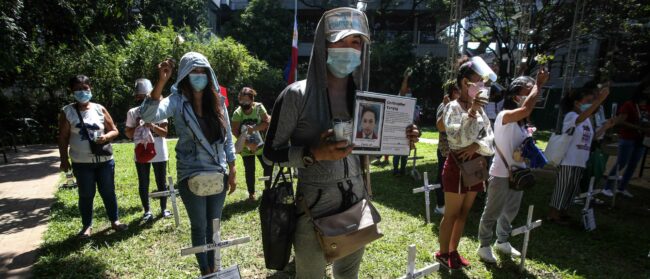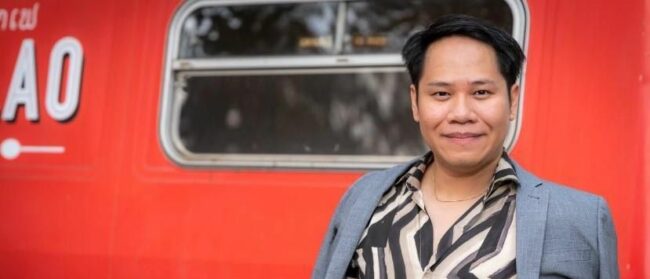On June 27, 13 women walked free from prison after an appeal court ruling in the Cambodian capital. The group – an unassuming bunch of working mothers aged from 25 to 72 – were arrested in May during a peaceful protest against the development of Boeung Kak, a large natural lake in central Phnom Penh which has been filled to make way for a glitzy housing and commercial development. Since their arrest, the women have become symbols of the widespread opposition to the Boeung Kak project, and their release triggered scenes of jubilation in the few lakeside communities that still remain.
Once ringed by a bustling community of more than 4,000 families, the lake is now a massive sand bank in the city centre. More than 85% of the residents have left, in exchange for resettlement or small cash hand-outs, and the old tourist district close to the lakeside is now a forlorn strip of shuttered shop-fronts and faded hotel signs. The company behind the development is Shukaku Inc, a secretive local firm that is reportedly working with two Chinese companies on the project.
Since 2007, when Shukaku Inc signed a $79m lease with city authorities, the Boeung Kak case has become one of the most high-profile land conflicts in Cambodia – a country that has seen a massive displacement of residents to make way for lucrative development projects.
In August last year, Prime Minister Hun Sen responded to mounting public pressure by granting lakeside residents 12.44 hectares on the site. It was a victory for the community, though many households remained outside the settlement area, and the protestors – led by the intrepid group of women from the lakeside – continued to take to the streets. In response, the city authorities have dubbed the women “professional protestors”, accusing them of serving the interests of “foreigners and extremist ‘human rights’ advocates”. On June 19, it accused foreign NGO workers of stoking the Boeung Kak campaign to “request for more funding [sic] for future activities and for their own personal interests to make a good living on the back of the protesters”.
They have also resorted to more violent means. During a protest against a forced eviction in September, lake activist Soung Sophorn was beaten unconscious by police; two months later, police stomped on six women demonstrating outside Phnom Penh City Hall. In May, police also temporarily detained Venerable Luon Sovath, a Buddhist monk who has supported the lakeside campaign, and threatened to disrobe him if he did not stop his advocacy. On May 22, 13 protest leaders were arrested for illegally occupying private land, and in a swift trial held just two days later – an unprecedented turnaround for Cambodia’s poorly-resourced court system – were each sentenced to two-and-a-half years jail. One land rights activist described the proceedings as “a show trial – a complete charade”, in which lawyers representing the women were given no chance to prepare a defence.
Amid mounting local and international pressure, the Cambodian Appeal Court bowed to pressure to release the “Boeung Kak 13” – though it upheld their original convictions. Despite her stressful experience, Tep Vanny, one of the protest leaders, vowed to continue the fight. “When I had a problem, like all people I depended on the authorities, but the authorities abandoned this community,” said the 32-year-old, who has become one of the public faces of the Boeung Kak campaign. “Villagers came here with empty hands after the Pol Pot regime, and they just want a place to live.”
The Scramble for Cambodia
Despite the increased scrutiny, intense secrecy continues to surround the Boeung Kak project. Shukaku Inc, though it appears in municipal announcements, is a phantom company with no known public office address; until recently, the Yellow Pages listed its headquarters as an empty lot in central Phnom Penh, and it currently has no listing at all. The firm, however, is well-connected: according to the 2007 lease agreement, it is owned by Lao Meng Khin, a leading tycoon and senator for the ruling Cambodian People’s Party (CPP), whose wife Choeung Sopheap controls Pheaphimex, a conglomerate that has benefited handsomely from the sell-off of Cambodian land. In addition to Boeung Kak lake, Pheaphimex is developing Phnom Penh’s old Borei Keila apartment complex, which saw a violent eviction of residents in January. It also holds a massive 315,000-hectare paper plantation concession spanning Pursat and Kampong Chhnang provinces, which has prompted a string of protests from affected villagers.
But Boeung Kak may well prove to be the jewel in Pheaphimex’s crown. Real estate agents estimate the land in the area to be worth around $1,000 per square metre in its undeveloped state, a value that could double once the development is completed. This yields a total land value of between $1.3 and $2.6 billion – up to 32 times the cost of the lease. It’s still unclear what Shukaku plans to build at the lake – on its website, Phnom Penh Municipality has stated that the area will become a centre “for business, culture, tourism, housing and resorts with infrastructure such as roads, sewage system [sic], green fields and entertainment halls” – but even if no construction takes place, the firm will reap a fortune from hawking the real estate.
It is a familiar story in today’s Cambodia. Since the late 1990s, the government has leased millions of hectares of land to foreign development companies working in cahoots with local tycoons, transforming the capital and turning wild parts of rural Cambodia into a patchwork of rubber, cashew, sugar and cassava plantations. According to the local human rights group Licadho, which monitors land disputes, foreign mining and agriculture firms now control a total of 3.9 million hectares in Cambodia – 22% of the country’s surface area. Industrial agri-business leases, known as economic land concessions (ELCs), account for 53% of Cambodia’s total arable land, of which Pheaphimex controls 16% – the most of any one firm.
These ELCs have also been blamed for the evictions of thousands of farmers from their land, and have led to an escalating number of protests, arrests and violent clashes in all corners of the country. On May 16, a week before the Boeung Kak arrests, a 14-year-old girl was shot dead by security forces during a violent land altercation in Kratie province. Activists have also launched a boycott against Cambodian “blood sugar”. According to the Cambodia Clean Sugar Campaign, villagers have been forcibly cleared from thousands of hectares of sugar plantations – including ten tracts of land owned by Ly Yong Phat, another CPP senator-tycoon – during which their crops were destroyed, homes burnt down and animals shot by hired goons and state security forces.
Yim Sovann, spokesman for the opposition Sam Rainsy Party, said the government faced a rising tide of opposition over this nationwide scramble for land. “If you want to solve the problem, you must stop giving land concessions to private companies. You must give all these land concessions to the Cambodian people. The priority is our farmers. If our farmers don’t have enough land, there will be social turmoil,” he said.
Hun Sen has responded to the bad publicity by announcing a moratorium on the granting of new ELCs. His May 7 order stated that officials should “temporarily postpone providing economic land concessions” and “ensure there is no impact to community land and people’s livelihoods”. He has also appointed his second son Hun Manith – a colonel in the armed forces – as deputy head of the government’s land dispute authority. In this role, Manith will be responsible for leading a new land titling drive, announced in mid-June, that will give displaced villagers parcels of land within ELCs and state forests. Early last month, hundreds of Cambodian students, attired in military fatigues, began fanning out around the country to begin measuring up land with government land officials. Im Chhun Lim, the Minister of Land Management, has said that the titling programme will “bring the safety of land occupation, leaving the owners free of concerns and confusion”.
But some observers are sceptical, pointing out that the ban was announced just prior to important local elections in early June. “[Hun Sen] knows that the population is against the CPP now, and the result of the elections showed a lot of disagreement,” said Son Soubert, an independent political analyst.
Others have pointed out that under the terms of Hun Sen’s moratorium, “pre-approved” ELCs have still been given the green light. On May 18, Hun Sen signed off on three new rubber plantations, totaling 21,624 hectares, followed by four further ELCs encompassing 35,000 hectares – all in protected areas and wildlife sanctuaries – on June 7. Licadho director Naly Pilorge said the loophole in the moratorium was so big “it swallows the ban” – and would still give the government carte blanche to grant more concessions. “The government needed to do something in response,” she said. “Unfortunately, the response appears largely to be window dressing and could create more problems.”
Whether the new land titling drive will have positive effects also remains to be seen. “We will only be able to judge whether it is a step forward when the government clarifies the process, provides public information and we see tangible results in which the people benefit,” Pilorge said.


